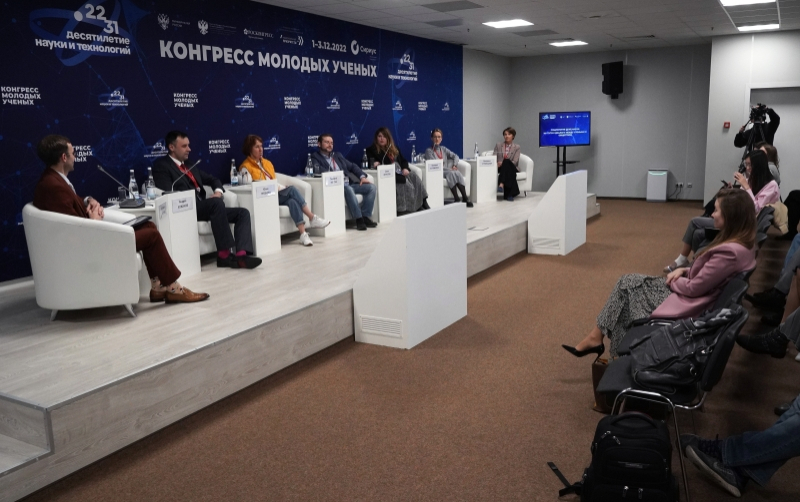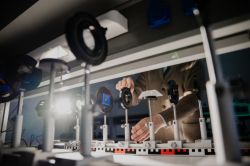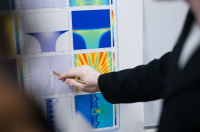Are scientists happy?
During the discussion Sociology [for] Science: On the Path to a Dialogue between Scientists and Society, held as part of the Congress of Young Scientists (CYS) 2022 evening program, experts shared the results of several recent surveys carried out among academic staff throughout 2022.
Yulia Gryaznova, the head of the Directorate of Strategy, Analytics and Research at National Priorities, spoke about a survey that took place from July 17 to August 5, 2022. The study, which drew responses from over 2,000 students and staff members from 300 universities and research institutes in Russia, aimed to determine how young researchers assess their career prospects, what motivates them to do science, and, most importantly, how happy they are with their lives and decisions. It turned out, more than half (52%) of scientists under 30 feel very happy, and only 14% of them are deeply unsatisfied, compared to 43% vs 29% among same-aged non-scholars.
Sociologists link scientists’ sense of self to their social status: 86% of respondents noted that they need to feel acknowledged for their work, while 95% put value on their family and friends’ opinions. Public recognition is viewed as a key factor by medical specialists and biologists but not mathematicians, computer scientists, and physicists.
Nevertheless, most scientists feel unappreciated in their job and do not consider their profession to gather enough value, stressed Tim Nestik, the head of the Laboratory of Social and Economic Psychology at the Institute of Psychology of the Russian Academy of Sciences. According to an online survey conducted by the Institute of Psychology and Rosatom on September 21 - October 4, only 30% of Russian researchers with publications in indexed journals (WoS and Scopus) find their job prestigious and 40% think of their job as a respected one. The statistics, however, do not match up with the results of a phone survey held by the same institute and Zircon Group in 2021-2022, which revealed that 62% of people respect the profession of a researcher and 59% find it prestigious.
Apart from overall job satisfaction, the survey also touched upon motivation in the workplace: 46% of respondents said that they are mostly driven by money, while 36% of them stated that they do their job to make the world a better place. The majority of researchers (65%) agreed that the most important motivator is an aspiration for self-improvement.
The speakers of the discussion Sociology [for] Science: On the Path to a Dialogue between Scientists and Society at the Congress of Young Scientists 2022. Credit: Aleksey Danichev / Congress of Young Scientists photobank / riamediabank.ru ![The speakers of the discussion Sociology [for] Science: On the Path to a Dialogue between Scientists and Society at the Congress of Young Scientists 2022. Credit: Aleksey Danichev / Congress of Young Scientists photobank / riamediabank.ru](/images/news/big/1294901.jpg)
What about depression?
Found happier, scientists, however, are not less prone to depression. As the research by the Institute of Psychology and Rosatom showed, roughly 45% of the 4,000 surveyed manifest common depressive symptoms. The condition hits experts in social sciences and humanities especially hard: one in two people from these fields are depressed.
Similar tendencies were noted by the experts from ITMO’s Center for Science Communication in their study held as part of the project Happiness and Well-Being in the Academic Environment in June 2022. The survey’s findings were revealed by the center’s head Daria Denisova. Aimed to assess the physical and mental health of the university’s students and staff, the poll, which included 389 participants, showed that 89% of them are generally satisfied with their lives and 65% consider themselves happy, whereas 63% manifested symptoms of distress and depression.
Public trust in science
Another topic mentioned during the discussion was public attitudes toward science and individual researchers in particular. Since 2021, the Institute of Psychology and Zircon Group have been monitoring public views about science in Russia. During this time, the organizations have conducted several large-scale surveys: the first study took place in March 2021 among 1,600 respondents, the second one was in January 2022 and included 2,200 people, and the third one took the form of a phone and online survey among 1,600 and 2,000 participants, 821 of whom took part in a similar study in 2021.
Sociologists noticed a striking pattern: in 2021, people started to trust science more yet lost their appetite for scientific discoveries. This correlates with the results of a survey by the Russian Public Opinion Research Center, according to which 89% of Russians say they are interested in science yet only 18% of them study papers and read scientific news.
Experts think that changes can start with star researchers who actively communicate with their audience and promote science through their media and online platforms. Yet, as scientists say themselves, 35% of them are ready to interact with journalists and share their research with a wider audience, while only 15% can call themselves active popularizers.





